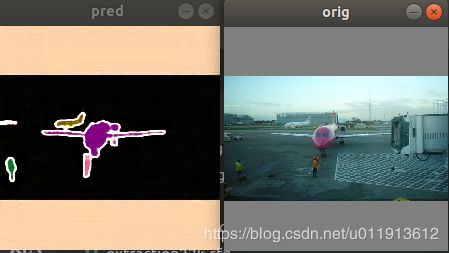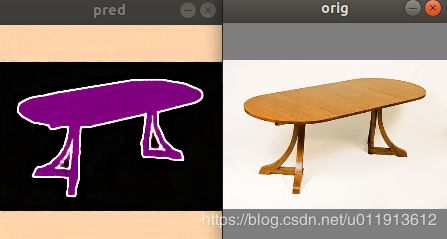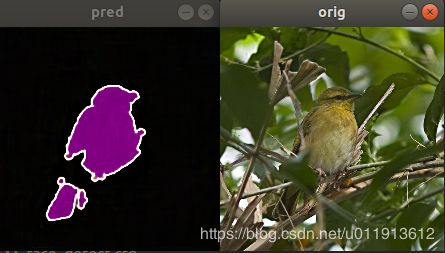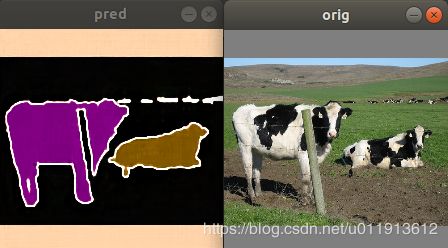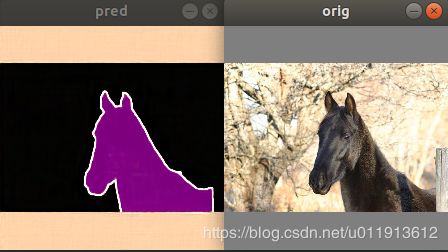全卷积的图片语义分割(基于darknet实现)
darknet已经实现了图片的语义分割,有一个segmenter.c的文件,但是没有对应的cfg文件,我大概看了下实现的源码,重新改了一班名为mseg.c的文件,使用的数据集依然是Voc2007,所有代码、权重文件、cfg文件都已上传github,感兴趣可以直接跑跑感受下darknet:
编译后,执行:
./darknet mseg test cfg/mseg.cfg model/mseg.weights data/mseg.jpg 然后你将会看到:
我要申明下,本来,规范的项目,应该是有个测试集,有个训练集。在训练集上训练,在测试集上测试,但是,这个项目只是我花了半天做出来玩玩的项目,我训练了几个小时(笔记本训练,是在伤不起)后,在训练集上看了下效果,发现效果很好,所以就没有继续训练了。其实我也随便下了一些网络的图片,看了下效果,发现效果非常差,我理解,首先,这个模型是很小的,因为我的笔记本算力有限,搭不了大模型。其次,受算力的影响,训练肯定是不充分的。但是,通过简单的训练在训练集上能取得如此效果,我觉得这种方法肯定是没问题的,是值得分享的,如果想取得更好的效果,将网络加深,充分训练,应该是能取得不错的效果的。
请高抬贵手,这不是论文,也不是什么正式的文章,只是记录了下自己的尝试,如果因此您觉得浪费了您的时间,非常抱歉。
更多示例:
训练模型
卷积+池化+上采样就可以:
layer filters size input output
0 conv 16 3 x 3 / 1 224 x 224 x 3 -> 224 x 224 x 16 0.043 BFLOPs
1 max 2 x 2 / 2 224 x 224 x 16 -> 112 x 112 x 16
2 conv 32 3 x 3 / 1 112 x 112 x 16 -> 112 x 112 x 32 0.116 BFLOPs
3 max 2 x 2 / 2 112 x 112 x 32 -> 56 x 56 x 32
4 conv 64 3 x 3 / 1 56 x 56 x 32 -> 56 x 56 x 64 0.116 BFLOPs
5 max 2 x 2 / 2 56 x 56 x 64 -> 28 x 28 x 64
6 conv 128 3 x 3 / 1 28 x 28 x 64 -> 28 x 28 x 128 0.116 BFLOPs
7 max 2 x 2 / 2 28 x 28 x 128 -> 14 x 14 x 128
8 conv 256 3 x 3 / 1 14 x 14 x 128 -> 14 x 14 x 256 0.116 BFLOPs
9 max 2 x 2 / 2 14 x 14 x 256 -> 7 x 7 x 256
10 conv 512 3 x 3 / 1 7 x 7 x 256 -> 7 x 7 x 512 0.116 BFLOPs
11 conv 512 3 x 3 / 1 7 x 7 x 512 -> 7 x 7 x 512 0.231 BFLOPs
12 upsample 2x 7 x 7 x 512 -> 14 x 14 x 512
13 conv 256 3 x 3 / 1 14 x 14 x 512 -> 14 x 14 x 256 0.462 BFLOPs
14 upsample 2x 14 x 14 x 256 -> 28 x 28 x 256
15 conv 128 3 x 3 / 1 28 x 28 x 256 -> 28 x 28 x 128 0.462 BFLOPs
16 upsample 2x 28 x 28 x 128 -> 56 x 56 x 128
17 conv 64 3 x 3 / 1 56 x 56 x 128 -> 56 x 56 x 64 0.462 BFLOPs
18 upsample 2x 56 x 56 x 64 -> 112 x 112 x 64
19 conv 32 3 x 3 / 1 112 x 112 x 64 -> 112 x 112 x 32 0.462 BFLOPs
20 upsample 2x 112 x 112 x 32 -> 224 x 224 x 32
21 conv 16 3 x 3 / 1 224 x 224 x 32 -> 224 x 224 x 16 0.462 BFLOPs
22 conv 3 3 x 3 / 1 224 x 224 x 16 -> 224 x 224 x 3 0.043 BFLOPs
23 cost 150528要训练的话,修改下图片的路径:
data.c下的load_data_mseg函数中的label_images和train_images:
data load_data_mseg(int n, char **paths, int m, int w, int h, int classes, int min, int max, float angle, float aspect, float hue, float saturation, float exposure, int div)
{
static char *label_images = "/home/javer/Downloads/VOCtrainval_06-Nov-2007/VOCdevkit/VOC2007/SegmentationObject/";
static char *train_images = "/home/javer/Downloads/VOCtrainval_06-Nov-2007/VOCdevkit/VOC2007/JPEGImages/";
char train_img[256];
char label_img[256];
char **random_paths = get_random_paths(paths, n, m);
int i;
data d = {0};
d.shallow = 0;
d.X.rows = n;
d.X.vals = calloc(d.X.rows, sizeof(float*));
d.X.cols = h*w*3;
d.y.rows = n;
d.y.cols = h*w*3;
d.y.vals = calloc(d.X.rows, sizeof(float*));
for(i = 0; i < n; ++i){
sprintf(train_img,"%s%s%s",train_images,random_paths[i],".jpg");
sprintf(label_img,"%s%s%s",label_images,random_paths[i],".png");
image orig = load_image_color(train_img, 0, 0);
image label = load_image_color(label_img, 0, 0);
image sized_img = letterbox_image(orig, w, h);
image sized_label = letterbox_image(label, w, h);
d.X.vals[i] = sized_img.data;
d.y.vals[i] = sized_label.data;
free_image(orig);
free_image(label);
// image rgb = mask_to_rgb(sized_label);
// show_image(rgb, "part",0);
// show_image(sized_img, "orig",1);
// cvWaitKey(0);
// free_image(rgb);
}
free(random_paths);
return d;
}另外,mseg.c中train_mseg.c中的连个路径也要修改:
void train_mseg(char *cfgfile, char *weightfile, int *gpus, int ngpus, int clear, int display)
{
int i;
char *train_images = "/home/javer/Downloads/VOCtrainval_06-Nov-2007/VOCdevkit/VOC2007/ImageSets/Segmentation/train.txt";
char *backup_directory = "/home/javer/Downloads/VOCtrainval_06-Nov-2007/VOCdevkit";然后执行如下命令开始训练:
./darknet mseg train cfg mseg.cfg如果对你有帮助,请点个星星支持下^-^

